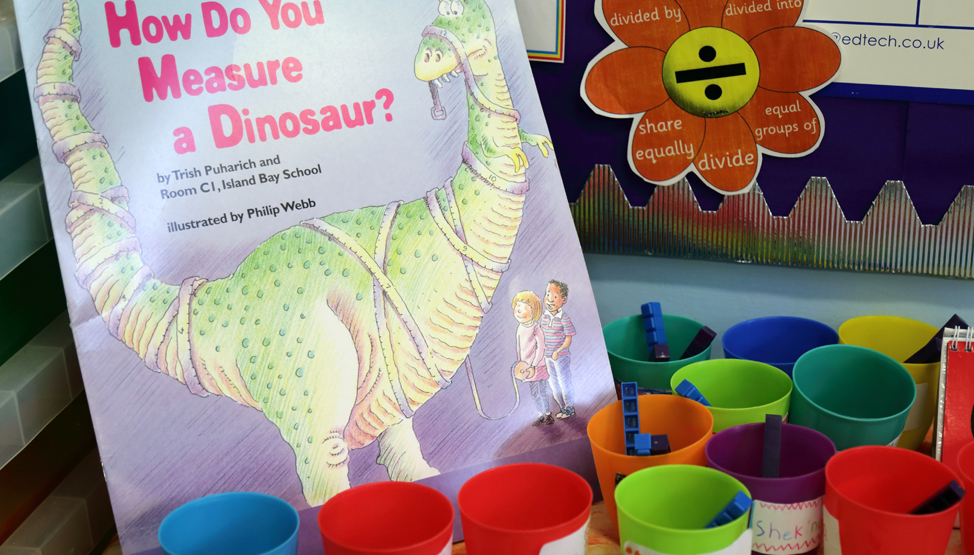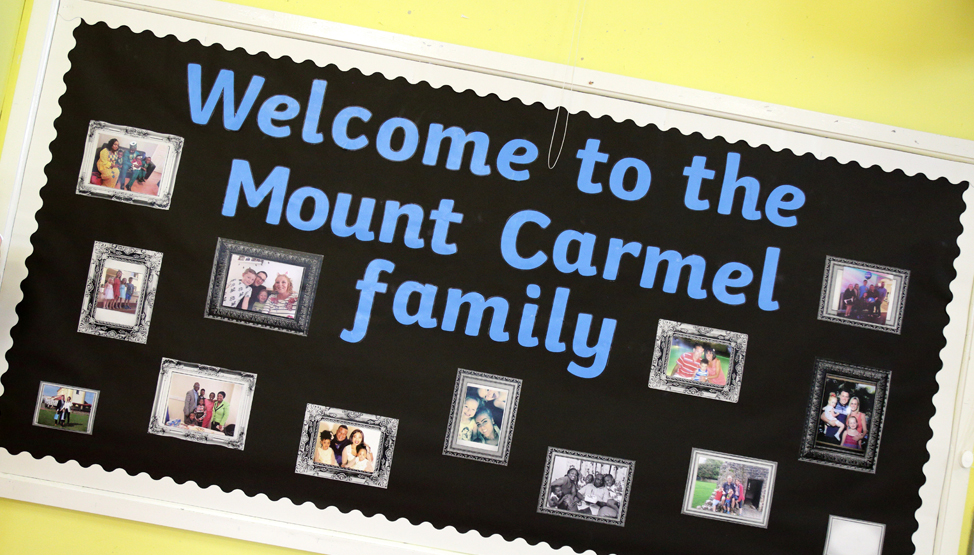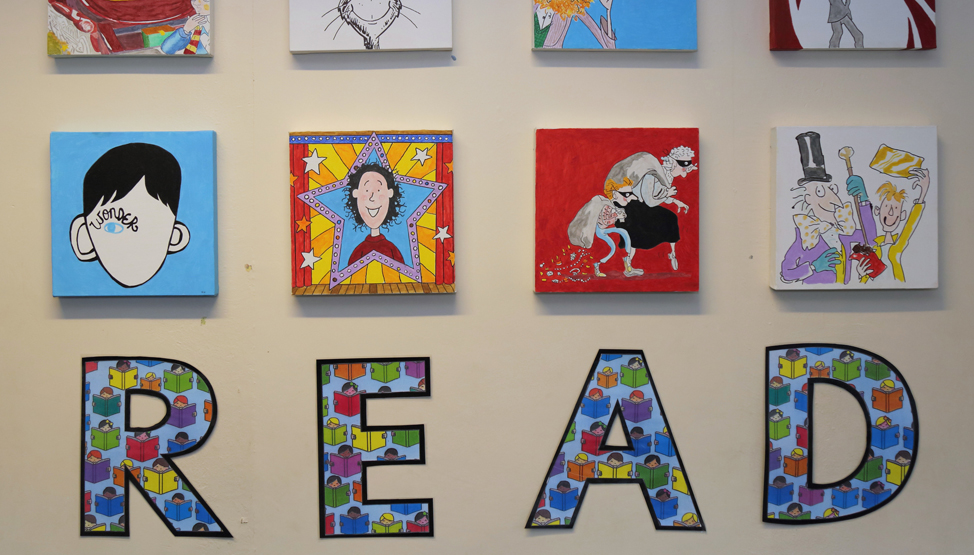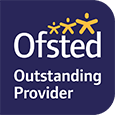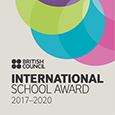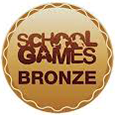English
English Curriculum Statement 2025/26
Intent
At Mount Carmel, we aim to deliver a broad and balanced English programme using objectives from the National Curriculum 2014 which determine the skills that are taught in each year group and Key Stage. Our aim is for all of our pupils to become competent readers, speakers, writers and spellers, who can transfer their English skills to other subjects so they are prepared for their future life in modern Britain. We nurture them as eloquent and articulate speakers and writers, who use a wide and purposeful vocabulary to clearly express their thoughts and ideas. We encourage them as readers, who select texts for purpose and pleasure. We aim for our pupils to read texts confidently, fluently and with good comprehension. Pupils are exposed to a wide range of high quality texts to encourage a passion for reading. We use quality picture books, novels, poems and non-fiction texts, which support children on the journey from reading to writing. We aim to ensure that pupils write clearly, accurately and coherently; adapting their language and style for a range of purposes, audiences and contexts and apply their grammatical knowledge in their writing.
Implementation
Our school provides daily English lessons that are progressive and support skill development. The Early Years Foundation Stage Curriculum is followed to ensure continuity and progression from entering Nursery, moving on to Reception Class and then through to the National Curriculum in KS1 and KS2. Quality children’s texts are at the heart of our English curriculum and they are carefully selected to engage and challenge pupils in their Literacy learning. Literacy skills are explicitly taught every day, but English skills are used and applied by children in all areas of the curriculum. Throughout English teaching, cross-curricular links are used to make the curriculum more engaging for children and to give them a purpose for their writing.
Reading
In EYFS and Year 1, pupils receive a daily phonics lesson using the systematic phonic based programme ‘Little Wandle Letters and Sounds’. Children are taught phonics as a whole class and those children requiring more targeted support in their phonetical knowledge, are provided with daily additional ‘keep up’ sessions where gaps in GPCs are plugged and children gain confidence with their blending skills. Following the ‘Little Wandle Letters and Sounds’ scheme of work, children in EYFS and Year 1 also access three small group reading sessions per week. Each session focuses on a different aspect of reading; decoding, prosody and comprehension. The children access the same book throughout the week and have the opportunity to further practise this book with an adult at home. Each year, parents/carers of our EYFS and KS1 children are invited into school so we can share with them how their child will be taught to read at Mount Carmel and what they can do to best support their child at home with this.
Guided Reading takes place in Year 2 and all KS2 classes using the Schofield and Sims Complete Comprehension scheme of work. Guided Reading sessions are delivered daily with a whole class approach. The scheme covers a wide variety of poetry, fiction and non-fiction texts, with the aim to develop the children’s vocabulary, inference and deduction, prediction, explanation (of authorial intent or impact on the reader), retrieval, summarising and sequencing skills. The scheme is supplemented with texts selected from each year group’s bespoke reading spine, which are linked to topics being covered that half term.
Every child at Mount Carmel has a reading record and an individual scheme reading book that links directly to their current phonetical knowledge. Children are also given the opportunity to take home an additional ‘reading for pleasure’ book, which they select themselves, with the view that this can be shared with an adult at home for enjoyment. We encourage all children and parents to read at home and for parents to log their practise within their reading records.
We consider reading to be the foundation on which the rest of the curriculum is built; children learn to read so they can read to learn. Each year group has a bespoke reading spine, full of carefully selected and culturally diverse texts linked to their learning across the curriculum that half term. The texts inspire and support the children in their wider learning and allow for opportunities for children to deepen their knowledge of a particular topic.
Our pupils are encouraged to read for pleasure and to read widely through our reading scheme and our school libraries. KS1 and KS2 classes have the opportunity to visit to our school library where they can choose a book, discuss and give feedback on books, read in a cosy space and listen to their teacher read to them. We consider storytelling and the sharing of stories to be the keystone to develop the enjoyment of reading; our children are read to daily by their teacher in all classes. During this special and protected time, our children experience and enjoy stories that they might not otherwise meet. We also encourage reading for pleasure through book fairs, author visits, reading challenges, celebrating World Book day and by holding a Big Bedtime Reading event. We encourage pupils to donate a book to their class as an alternative to giving sweets on their birthday.
Writing
Units of work are planned following our bespoke ‘writing journey’, where children are supported and guided through the initial vocabulary gathering and planning stages, through to the final proof-reading, editing and publishing stages. Pupils are provided with purposeful opportunities to write in a variety of genres and literary styles. Our writing overviews demonstrate how teachers use opportunities in our broad, balanced curriculum to further embed, extend and develop the writing skills of our children through cross-curricular learning. We develop writing skills so that our children have the stamina and ability to write at the age expected standard. We provide a wide range of activities including the use of film and imagery, music, ICT, modelled, shared and guided writing, peer and self- assessment and discussion.
In all areas of the curriculum, speaking and listening skills are developed through talk partners, group discussions and drama activities. By developing pupils’ spoken language, we aim to improve their ability to write clearly and coherently.
Spelling, punctuation and grammar skills are taught explicitly throughout KS1 and KS2 and are a focus in all writing across the curriculum.
Years 2-6 use the Read, Write Inc. spelling scheme and pupils practise their spellings at home and are tested weekly.
Cursive handwriting is taught using the Letterjoin programme. Pupils are expected to apply this cursive script in their daily writing. Pupils can practise their handwriting at home by accessing the Letterjoin website.
Pupils are assessed against the 2014 National Curriculum Programmes of Study. Pupils are expected to attain the ‘Age Related Expectations’ (ARE) by the end of each school year. We use a combination of formal methods of assessment, statutory assessments and teacher assessed learning to gain an overall picture of our pupils’ progress and attainment.
Oracy
Our aim is for every child to communicate clearly and effectively for a range of purposes in the wider world. We use discussion in our lessons to deepen learning and allow the children opportunities to elaborate and explain clearly their thinking with others. We aim for all our children to become competent and confident in the art of speaking and listening and allow them to express themselves creatively through performance poetry and drama.
Impact
· Pupils enjoy writing and use the features of different genres and styles. They can write for different purposes and audiences.
· Skills progress in grammar and punctuation is evident throughout the school in children’s books and in our writing overviews.
· Writing across the curriculum is the same standard as in English books.
· There is evidence of a clear ‘writing journey’ in books
· A range of genres are taught across the school (progressing in difficulty) resulting in pupils being exposed to, and knowledgeable about, literary styles, authors and genres. They can express preferences and give opinions, supported by evidence, about different texts.
· Next steps marking provides positive support and directs the pupil on their next steps to improve their writing.
· Pupils’ work is moderated in school and in cluster meetings with other schools to ensure accurate assessments are made.
· Teachers track pupils’ progress at Weeks 10, 20 and 30.
· Each term, pupil progress meetings are held with the Headteacher, deputy headteacher, SENCO and class teachers to ensure different groups and individual progress is monitored and interventions organised to support progress.
· Intervention sessions enable a greater proportion of pupils to be on track to meet year group expectations.
· Subject leader conducts learning walks and book monitoring throughout the year. These inform future areas for improvement and the impact of new initiatives.
· Standards are being met at the end of EYFS, Phonics Screening Check, KS1 and KS2 in line with local and national averages. Each year data is analysed and any areas for improvement identified and addressed.

